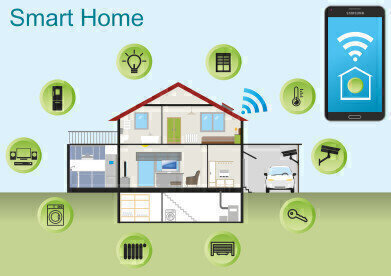Environmental Laboratory
How Does Smart Home Automation Affect the Environment?
Apr 29 2018
The practice of smart home automation – or the interconnectivity of household appliances, lighting, heating and security measures through the internet – is becoming more and more popular in the UK and abroad. One of the purported selling points of such a system is the beneficial effects it has on the environment (and on bills) by optimising the use of energy and flattening peak consumption rates.
While previous studies have appeared to support such a hypothesis, a new paper from the University of Oulu in Finland suggests this may not be the case. By using a life-cycle assessment (LCA) method of analysis, the researchers concluded that the consumption of energy of the smart devices outweighs the benefits that they offer over a five-year period. The findings cast aspersions on the efficacy of smart home automation as a viable environmental tool.
What is smart home automation?
Smart home automation is the practice of using internet-enabled devices to remotely and automatically control appliances, lighting fixtures, heating systems and security measures in and around your home. For example, you could use your phone to turn on the oven just as you’re leaving work so that dinner is ready by the time you arrive home, or synchronise your heating with weather forecasts to make sure your house is never unduly cold.
In practice, it sounds like the stuff of science-fiction and proponents of the technology have capitalised upon a growing market for environmental gadgetry by promising it can reduce electricity consumption through only turning on lights, heating and appliances when they are really needed. Previous studies on the subject (such as the 2014 paper from Jean-Nicolas Louis) have tended to agree that automation can reduce energy consumption and carbon emissions, with Louis arguing in the linked study that a smart home can bring down CO2 emissions by 13%.
The other side of the coin
The new study, also undertaken by Louis and published in the journal Science Direct, seeks to provide further clarity on the subject by taking into account the electricity consumption of the smart plugs themselves. Assuming that the home energy management system (HEMS) would have a lifespan of five years, the team found that smart meters would be capable of paying for themselves (in terms of energy consumption) within 3.5 months of a year, giving 8.5 months of benefits. They would also give a single month of benefits with regards to carbon emissions every year.
However, the smart plugs were far more energy intensive in their consumption, using over four times the amount that the meters did. In fact, they did not prove themselves to be worth the investment either from an energy consumption or carbon emissions standpoint over the five-year period and suffered a deficit of 1.6 years. These findings lend weight to the idea that smart devices may actually contribute to global warming rather than prevent it, and call for the industry to place greater emphasis on the amount of electricity consumed by smart devices when weighing up their pros and cons.
Digital Edition
AET 28.2 April/May 2024
May 2024
Business News - Teledyne Marine expands with the acquisition of Valeport - Signal partners with gas analysis experts in Korea Air Monitoring - Continuous Fine Particulate Emission Monitor...
View all digital editions
Events
Jul 30 2024 Jakarta, Indonesia
China Energy Summit & Exhibition
Jul 31 2024 Beijing, China
2024 Beijing International Coal & Mining Exhibition
Aug 07 2024 Beijing, China
IWA World Water Congress & Exhibition
Aug 11 2024 Toronto, Canada
Aug 25 2024 Stockholm, Sweden and online









.jpg)








